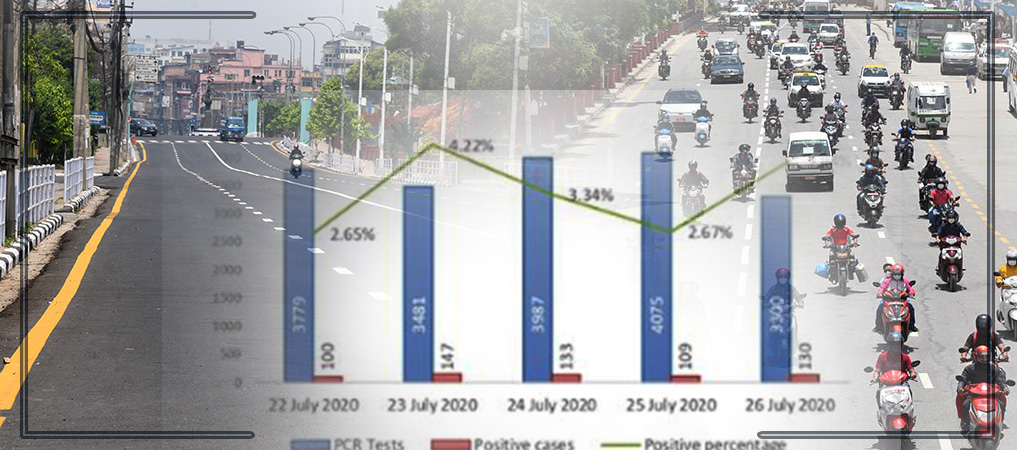Infection rate hasn't increased: Govt., Risk is still high: health experts

By Ishwar Chandra Jha, Kathmandu, July 27: Almost a week has elapsed since the government lifted COVID-19 lockdown restrictions. Although the COVID-19 cases were expected to rise with the increased human mobilty post lockdown, according to the Ministry of Health and Population (MoHP), no huge difference has been seen in the daily infection rate in the last five days.
The public health experts, on the other hand, had anticipated massive increase in COVID-19 cases after the end of nationwide lockdown.
Drawing a conclusion only on the basis of Polymerase Chain Reaction (PCR) test results of those placed in quarantines or those who need the test result for employment might invite a voluntary misfortune in the days to come, warn the public health experts.
Dr. Jageshwor Gautam, spokesperson of the MoHP, said that the average infection rate from July 17 to 21 stood at 3.2 per cent. On July 21, the meeting of the Council of Ministers had decided to lift the lockdown restrictions.
From July 22 to 26, the average infection rate reached 3.3 per cent.
In figures, of the 17,989 PCR tests done from July 17 to 21, only 750 had tested positive for the virus.
After the end of lockdown, from July 22 to 26, only 619 were found with the virus infection.
Meanwhile, Dr. Rabindra Pandey, public health expert said, “The state of COVID-19 spread in our society can be ascertained only by carrying out PCR test of the people without travel history.”
The PCR test reports positive only after 5-10 days of contracting the virus. Thus, it isn’t appropriate to conclude this early about the state of the virus transmission in our community, he added.
Stating that the PCR tests were being conducted in the same amount post COVID-19 lockdown, Dr. Pandey said, “The real picture will be revealed only after the tests are performed in areas such as town alleys, brick kilns, tea shops, local liquor shops, cold stores, meat shops, vegetable market and people involved in waste management, among others.”
He added that the COVID-19 test should be expanded in those people who are less informed about the pandemic.
Although Nepal’s COVID-19 response has complied with all the standards set by the World Health Organisation (WHO), it is vital to expand the COVID-19 tests in order to prevent the risk of virus infection in the days to come, said Dr. Pandey.
Recent News

Do not make expressions casting dout on election: EC
14 Apr, 2022
CM Bhatta says may New Year 2079 BS inspire positive thinking
14 Apr, 2022
Three new cases, 44 recoveries in 24 hours
14 Apr, 2022
689 climbers of 84 teams so far acquire permits for climbing various peaks this spring season
14 Apr, 2022
How the rising cost of living crisis is impacting Nepal
14 Apr, 2022
US military confirms an interstellar meteor collided with Earth
14 Apr, 2022
Valneva Covid vaccine approved for use in UK
14 Apr, 2022
Chair Prachanda highlights need of unity among Maoist, Communist forces
14 Apr, 2022
Ranbir Kapoor and Alia Bhatt: Bollywood toasts star couple on wedding
14 Apr, 2022
President Bhandari confers decorations (Photo Feature)
14 Apr, 2022











